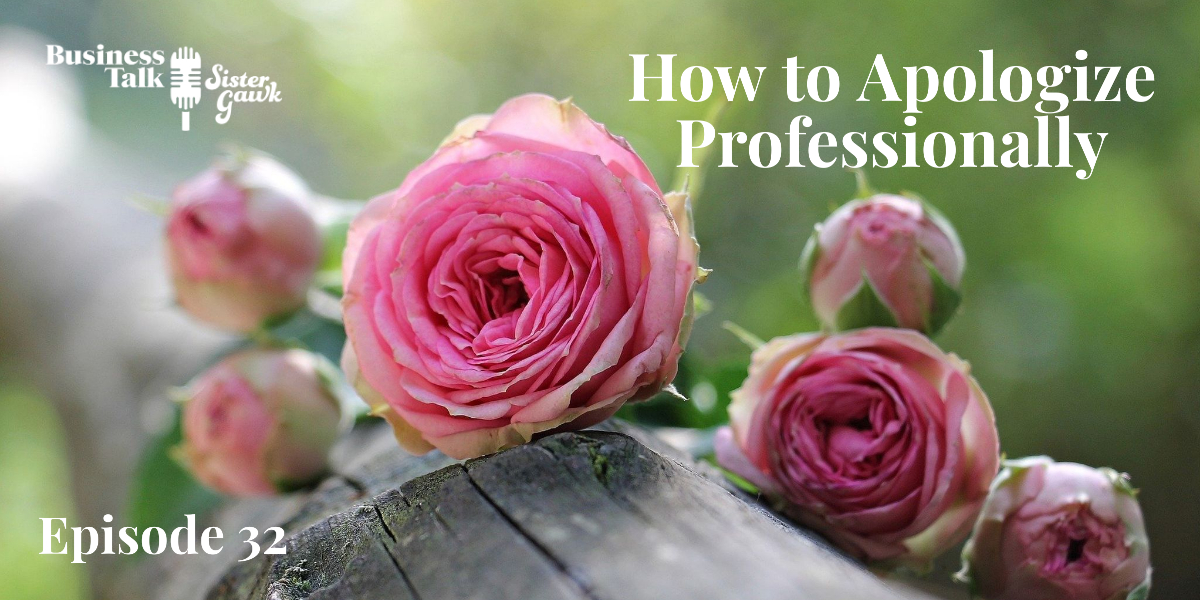We dig into the steps you should take to reconciling a situation through professionally apologizing in this episode. From people who maybe aren’t understanding the situation, to listening to other people’s feelings. It’s great resolve conflict in a healthy way.
Today, we are going to be talking about apologies.
Ruthie: True! We are! That’s true!
Bekkah: How to make a professional apology. Ruthie is literally busting a gut over here and we have not even started yet.
Ruthie: I just keep thinking of all the stupid apologies I’ve done in my life. Oh it’s fine. We’re doing great.
Bekkah: We consider ourselves experts on this subject actually mostly because we’ve both said some really offensive things and had to grovel and eat our words.
Ruthie: True. Over and over again. Open mouth, insert foot, let’s go, try to sprint.
Bekkah: So Ruthie’s got the questions on this one so she’s going to ask them.
Ruthie: To begin with why is it so hard to apologize?
Why Is It So Hard to Apologize?
Bekkah: Ruthie actually knows a lot about the psychological aspects. I’ll tell you why it’s hard for me to apologize because of pride. Especially when you think you’re right and then trying to talk to that person about why you don’t agree with them is difficult.
Ruthie: One of the the resources that I pulled was a video by Brene Brown who I love. She’s really awesome; a really cool psychologist. Or just knows a lot about psychology and stuff like that I don’t know if her official title psychologist. Anyway, one thing that she says is that it’s really hard to just listen to when someone is coming at you with anger and pain. When they’re confronting you with that like if they’re saying, “You did this wrong.” You automatically have to overcome defensiveness of them telling you that and it’s not just you’re angry with them for telling you that or whatever it’s that pain piece of one all of a sudden realizing that you offended someone and then two realizing that they expect you to apologize and you have to suddenly make this decision to how you’re going to respond.
Obviously there can be other circumstances as well where you know beforehand, and it’s not always like, “You said this, and I’m offended!” Sometimes, you might find out after the fact or whatever or offhand from somebody else and then you have to sit with that and think about how you’re going to apologize. I think Bekkah is exactly right! That it is a pride thing! One thing that I thought was interesting also from Brene Brown is that “no apology has meaning unless you are able to put unless we are able to put aside our defensiveness and really listen”. That is something that I am a pit of garbage at, honestly. I’m just very bad at listening. But Bekkah tell us a story about when you failed to listen when someone was trying to tell you something.
Bekkah: Yeah, okay. I used to – I’ve had many jobs in my life. I was a long-term substitute teacher for facts class for seventh and eighth grade.
Ruthie: For what class?
Bekkah: FACTS. It’s like the –
Ruthie: Home Ec.?
Bekkah: The politically correct version of Home Ec. now or something. I don’t know. It stands for like “family something rather”. (Family Consumer Science) I don’t know. I should know. I taught the class! Anyway, one of the things we talked about with some data on the family structure and the kids were supposed to like research what the impacts of your parents are on raising you and stuff. One of the data points that was researched was basically talking about how having a father figure in your life dramatically increases your ability to succeed. I don’t have the exact data on it, but we had it up on the on the screen and we were talking about it or whatever. One of the girls is like, “I’m offended by that, because I don’t have a dad here, and I can’t believe you would say that about me.” And I was just thinking to myself, I’m not saying that about you at all! This what the data says!
Take A Step Back to Acknowledge Someone’s Feelings About A Situation
That was like a super hard moment for me because I’m thinking to myself, “Okay, where’s the logic here? And clearly you don’t understand statistics!” But that wasn’t the moment to do that, right? And that was kind of one of those situations where we had to be like, “Okay, well, I’m sorry that that’s how you’re feeling. We’re not saying that about you at all. In fact, lots of people are successful regardless of their parent upbringing even if they had a terrible, or no parents at all!”
But, yeah, coming back away from that, I had to sit there and think about it for a while. “Okay this is a vulnerable person not necessarily vulnerable because of their background or whatever but because they’re in seventh grade! They’re shapeable! This is a small person, and you have an impact over their life so what does that look like to be a positive impact?” In just talking with her or like the family and just saying, “Hey, this is what we talked about just wanted to make sure you guys were on the same page about this.” And communicate with them, “I’m sorry if that offended you.” The response of her family was something like, “No, it’s data. She doesn’t know what she’s talking about.”
I mean I’m not saying that she didn’t, but maybe she just didn’t understand the concept of what we were talking about at the time. I think it’s important to address those things because if somebody is really upset with something you said.
And sometimes I’ve made jokes where like everybody laughed and it was funny and then afterwards someone was like, “That was really mean.” Like one time I told my friend and he listens to our podcast so he will know who this is, but I saw that him in the grocery store with my husband and I was like, “I knew that you were here because your car looks like an alien!”
Ruthie: What?
Bekkah: Because it’s a very recognizable vehicle!
Ruthie: Okay.
Bekkah: And then Joel told me that I had to go apologize. So I did! Things like that.
Ruthie: Why did it look like an alien?
Bekkah: It just, the headlights are shaped like those alien eyes.
Ruthie: Oh, okay,
Bekkah: You know, like the little green guy. Yeah anyways.
Ruthie: Okay
Bekkah: It doesn’t matter, because stuff like that where I don’t even realize I say things sometimes they’re really mean. So I’m very good at what’s called “eating crow”
Bekkah: Okay but how do we actually apologize, Ruthie? What does that look like?
When You Apologize, Be A Person of Integrity
Ruthie: I talked with one of my friends about this and he had some really interesting things to say that I thought was really valuable. He kind of laid it down into like four different steps which I thought would be interesting if I read them off so basically the first step is to go to that person and essentially like just be a person of integrity and ask them what the full extent of that impact was. So if we’re thinking about this in a business context, say you are an auto body shop and you know for a fact that one of your client or customers are really, really upset about what happened with their tires. Your people were supposed to do something for them and then it didn’t work out or they like broke the axle let’s say. Going to them and this person is like hot and bothered. Maybe they’re driving down the road and then the whole axle just like snapped in half and then they had all this problems –
Bekkah: That would like totally kill you. I don’t know what you’re talking about.
Ruthie: They were driving very slow! They’re fine! They just left the shop. Anyway they’re in front of your yard and it’s broken. So then they come up and they’re just screaming at you. The first the first step would be to just understand what the full impact of it was. Obviously, there’s the full the impact of what happened physically but maybe they’re late for work or maybe they have to go pick up their kid from daycare just like asking those questions in a non-invasive way but just saying, “I am so sorry that happened. What do you have going on in this day that we can help you with? Or where do you need to be right now?” And trying to really understand the full impact of why they’re so upset and just kind of meeting them in that. The second thing is to just listen.
As a Business Owner, Do Not Cast Blame On the Customer
And just really take in what they’re saying and not meeting it with judgment, not meeting it with, “Well, this is what you should have done!” And “So-and-so did this and so he’s the one at fault and we need to bring him in on this and you chew out him don’t you want me!” But just sitting and really listening. And then the third thing is to apologize, you know and like actually being sincere about that. Another thing that I was listening to, her name is Harriet Lerner. She is also a psychologist who I enjoy listening to. She talked about how when you apologize but you’re not sincere or you have no intention of actually – I want to say remediating. Is that a word? Bringing remedy? Yeah – to the situation then it can actually make it so much worse! And Bekkah you had a story about that and then I’ll finish with the the end point that my friend was telling me about.
Do Not Make A Customer Feel Helpless Or That You Have No Intention Of Improving
Bekkah: Okay so one time I went to a store and I was saying, “Oh, okay, I’m ready to have a meeting or whatever.” We had set up a meeting because now everything is you have to have a meeting or an appointment. I got there and she was telling me, “You know what you have to have all these documents.” And I’m like, “I drove here yesterday and scheduled this meeting with you and you’re telling me that I was supposed to bring all these documents and you didn’t tell me when I booked the appointment?” And she was like, “Well, you could always book your appointment online and I’m like, “How does this solve the problem?” I said, “Can you show me where to book it online, because I don’t even know how to do that.” And she’s like, “Well, you have to find it on the website.”
So I’m on the website and it’s not working and then she says, “Well, you have to google it!” “Oh, okay!” So we finally get to that point and I’m like, “Is there a way we can make this process better? So that in the future, the next person doesn’t have the same problem where they come to the appointment and don’t have these documents?” And she says to me, “Well, you can call the customer service line but they’re not going to care who I am! You can tell them my name! They’re not going to care! They’re a different department! And I’m like, “Oh my word! You’re not really solving any problem! And I’m just trying to make the process better and you don’t even want to change the process!” So she was just like, “Well, I’m sorry but, no. There’s nothing we can do. Corporate does not care about this and even if you were to tell them to fix the process they’re not going to!” I’m like, “You’re the one who booked the appointment!”
Anyways it was just in that situation I definitely felt helpless and like the situation was made worse because even though she was apologizing like, “Well, I’m sorry that happened to you.” She wasn’t trying to come up with any solution or owning the problem like what Ruthie was talking about. That point that Ruthie was making about taking one for the team that is really huge! I’m actually shocked to find that a lot of people don’t do that. In any kind of business or in a work environment where a customer is really upset and that individual that answers that call starts freaking out back on them. And then says, “Well, it’s not my fault! You should be inside this business! It’s horrible!” Like all this stuff!
Ruthie: Great.
Having the Freedom to Apologize Well, Increases Your Likelihood of Keeping That Customer
Bekkah: It’s a really poor reflection on the company. And it represents your future business with that customer completely wrong, right? Whereas if you have good customer service – oh my goodness! Okay! Let me give you an example of excellent customer service. I’m going to even link to their website in the blog because I just love them! Okay Charles Schwab Banking.
Ruthie: Oh, I love this story! Amazing!
Bekkah: Oh they’re just the best customer service I have ever had to deal with. So I have an account with them and then when I got married I called them and said, “Hey, I want to put my husband on my account!” And if you listen to our payoff debt you know that my husband was on the account because I don’t have secret accounts, okay! Anyway they were like, “Send in all this information, blah blah blah.” So I did and I faxed it in they’re like, “Yep! We got it!” So then I was like, “Great! It’s updated!” Well, a month later I go in there and he’s not on the account after I had faxed in all of the stuff!
Ruthie: *Sarcastically* Secret account! Just kidding.
Bekkah: Stop, it wasn’t intentional. Anyway, so I called them and was telling them, “Hey, this happened and I submitted all the paperwork!” Somehow they couldn’t find it or something. I don’t know but the lady on the phone was like, “I am so sorry this happened to you! Let me help you with this!” And she walked me through the process again. We resubmitted everything again. And at the time, I was just like, “Well, that took forever. Hopefully it works this time!” It did but the best part about that was literally she sent me a Harry and David’s gift basket to my house! because she had it on file.
Ruthie: And what was in this gift basket!?
Bekkah: Just chocolate and cookies!
Ruthie: Uh-huh! Mmhmm!
Bekkah: And like it came with like a bed and breakfast tray and everything!
Ruthie: Like we’re not talking like crusty cookies here like these were like monster cookies that were soft and delicious.
Make Kind Gestures to Show Your Customer You Are Sincere
Bekkah: If you’ve ever bought anything on the Harry and David’s website one of those gift baskets was more than was in my account. And I was like, “Wow! They really care about me!” And I loved it because they actually went the extra mile and they give their customer service team the ability to make those calls, individually. When you give a person the ability to own up for an apology and say, “You know, I’m so sorry!” And they actually have something they can do like, “Let me just give you a discount on this or is there anything I can do to try to make your day better?”
Even if it’s like a little thing like writing a note, whatever. If you can’t resolve it in the call or if they’re still a little upset, elevating it to somebody in your company or if you’re the business owner make it a point of documenting a new solution to that problem and then following up with them and say, “Hey, you know, I’m so sorry that happened to you but we now have a process in place because of you. I know that’s a hard thing to be the groundbreaker in processes but now we have one because of your issues so that won’t happen again. We just really appreciate your patience with us.”
Have a Timely Response to Your Customer to Let Them Know The Action You Took
Ruthie: Yeah and that kind of goes back, so I’ll recap the the four points that I was going through before, but I just read this article that was talking about how when you have a known issue that comes up then you have a responsibility to be timely in your response. So if it’s like a really really heated discussion you can take a second to let it settle down and take a deep breath, but it’s your responsibility to reach out to that person as soon as you can because the longer it festers the worse it gets. And the more impact it can have on the reputation of your company. And if you’re known as a company that is very prompt in how they respond to issues and like people are like, “Oh, they take care of that right away – you’re building your integrity as a company.” *laughing* What!
Bekkah: I’m sorry! I don’t like the word “fester”. But on top of that I’m just imagining somebody going, “Oh, that company. I don’t like them. They let their issues fester.”
Ruthie: Okay so in recap of those those four points that have been kind of the theme throughout this whole episode. Basically like ask the extent of the wrong that happened or whatever even if you feel like you did not wrong someone just owning up to it even if it was not your own fault and finding out what the extent of that was. And then listening just being really open-minded and opening your heart to just let let them say what they need to say and being a safe space for that. And then apologizing, and then the last point is to re-establish the expectations for moving forward. If they’re like, “Well, you did this and this and this and!”
Tell The Customer What You’re Going to Do, And Follow Through on It
You’re apologizing and then you’re saying, “Moving forward, this is how I will respond in the future,” or, “This is how we will respond as a company.” And this is the going back to, “This is the standard that we have set for ourselves and we have failed to do that for you in this case and we’re going to make that right.” And then you go forward and you make it right, because that’s what a company of integrity does.
Bekkah: Yeah I’m also going to point out though that if you work in a really big company, that might not be
something you can do saying, “Well, moving forward this is what we’re going to do.” Because you can’t set those policies. In a small business you absolutely can. I just dropped my phone on the ground, if you heard that.
Ruthie: *Laughs*
Bekkah: Anyways but within that, thinking about what Ruthie was saying, owning up to even if you didn’t do
it. I want to just clarify what that means I’m not going to be like, “Yeah, you’re right I did that.”
Ruthie: “That was me. I severed the axle in your car and sent you on your way.”
Bekkah: No, I mean maybe it was already broken and that just happened to occur at the same time, right? But when we’re talking about that it’s important to understand that person’s perspective and apologize that they feel that way. It’s not saying, “You know what, I’m going to acknowledge that I broke your axle.” No, it’s saying, “I’m really sorry that you are so frustrated about this and I’m so sorry this happened to you and this is what I’m going to try to do to help you.” You know it’s not sitting there and saying, “Oh, yeah. I totally went out of my way to do that to you.” No, but trying to acknowledge their frustration is very, very important to resolving that. But be sincere about it because if you’re just like, “Oh, yeah, I can see you’re frustrated. Well, this is what I’m going to do.” The tone in which you say it is really important in actually apologizing.
Ruthie: Yeah this is where we’re going to do a little plug for our Facebook page. So we know people are listening to our podcast because guess what we have analytics! Look at that! Lucky us!
Bekkah: And some of you have actually told me that you listen to our podcast and I’m just going to say right now you guys have not liked the Facebook page so if you’re listening to this you should get on the Facebook page and like it.




